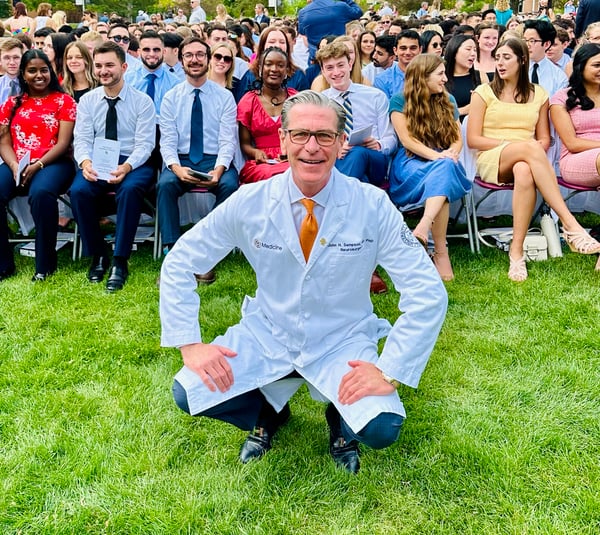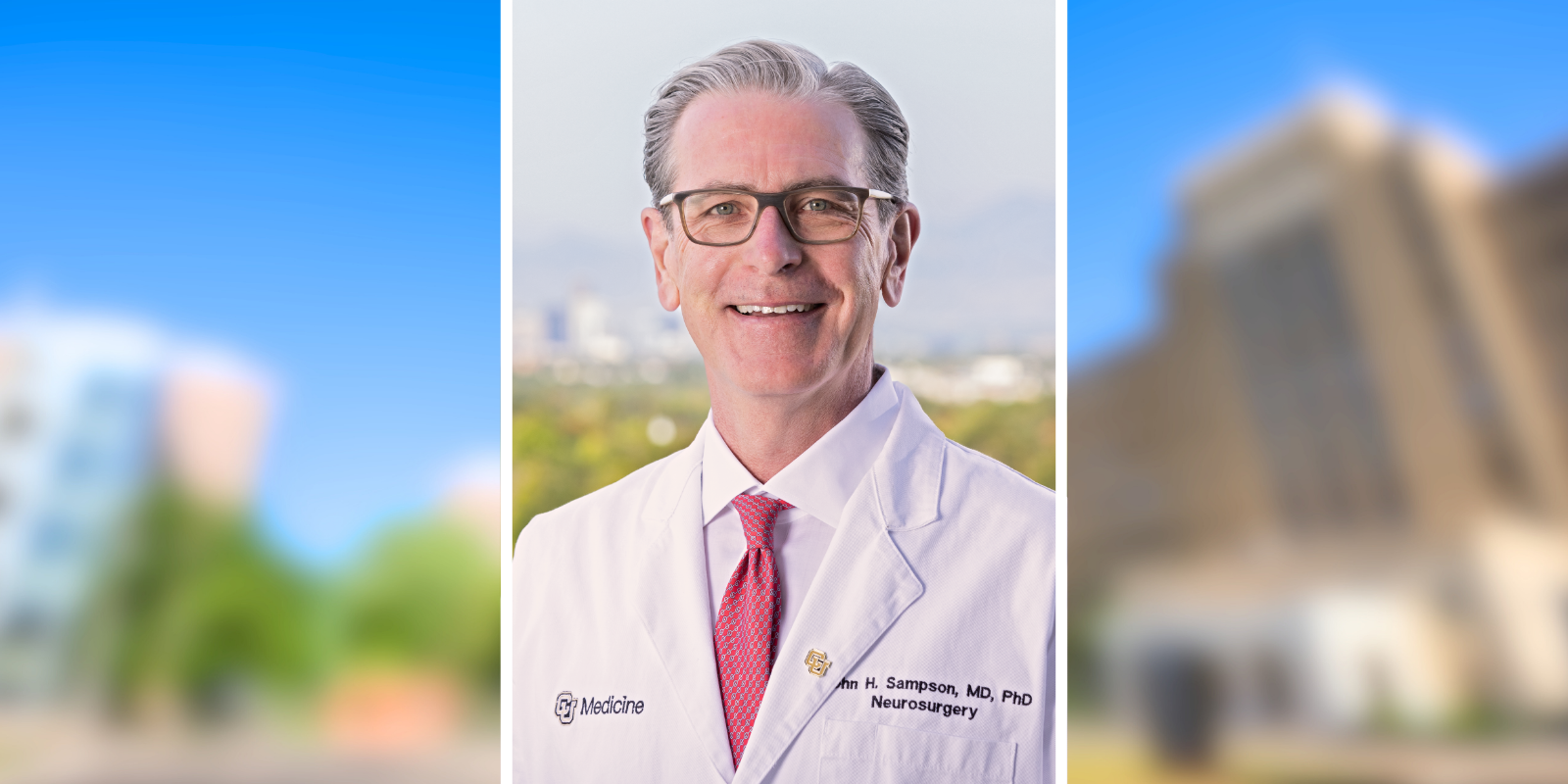What are your goals for the University of Colorado School of Medicine?
Top 10 in 10 years! It’s simple. I want to put us on the map in a way that reflects the incredible education, research, and clinical care across the broad spectrum that is our campus. To do this, we will need to continue to differentiate ourselves. I want people to fly here and move here to get smarter, kinder, and healthier. I truly believe CU is a place to DREAM!
What has surprised you about the CU School of Medicine since you’ve arrived?
The people. I got a sense of the soul of this place when I visited during my interviews, so in some ways this wasn’t a surprise, but the people here are incredible! I’ve never seen such passion, inspiration, aspiration, dedication, and caring.
What also surprised me is that the problems I have worked on elsewhere were also present here—but different. Here, it was clear that everybody saw them as opportunities to do better.
On a personal note, I was surprised at the cost of housing in Denver! And, for our CU community, we must take steps to address the issue.
Finally, although also not surprising, it was delightful to see how much I enjoy Denver.
What do you consider major challenges facing academic medicine?
Where should I begin? There are many challenges at all levels facing our clinicians, research faculty, students, and staff. There are a lot of headwinds.
For our students, I think medical education—when you consider undergraduate degree requirements, medical, nursing or advanced practice schooling, research time, and often postdoctoral clinical or research fellowships—just takes too much time. And at the end of all that, our learners end up with insurmountable debt. We need to change that.

Dean John Sampson at the Matriculation Ceremony in July for the Class of 2028.
For our research faculty, there have been minimal increases in research funding (if any), and it takes far too long to get that first grant. In addition, we need to better support those who pursue both a complementary clinical and research path.
For our clinicians, we must bring back the joy in taking care of patients. The burden has become too great, and it’s leading to burnout and other more serious consequences in our field at unprecedented levels. It’s no wonder there are significant clinician shortages across almost all specialties. To compound all of this, we still have significant inequities in how we compensate our clinical care providers.
For our patients, this often manifests in disparities in the care that we provide and a lack of access to quality care from the preventive and primary care to the most specialized.
For our health care partners, they are facing enormous challenges with decreased revenue, skyrocketing labor costs, stifling regulation, and unfair competition.
Our entire community depends on us, and we take very seriously our responsibility to serve everyone equitably and with the highest quality. This includes our most vulnerable patient populations and the rural communities of Colorado.
Which leaders in your career have influenced how you approached how you lead?
I have been blessed to have a number of extraordinary mentors.
I carry many things with me that I learned from my first chief of neurosurgery, Allan Friedman. He probably doesn’t think so, but he has an amazing sense of humor. From him, I took away a number of sayings that I reflect on almost daily. The most relevant one to me right now is: “Don’t eat the whole moose.” I think Allan chose this large mammal as a reference because he knew I was Canadian, but the lesson is not to take on everything at once. This is a skill I am working on daily, especially being new to CU.
Another one of his sayings was: “It’s better to take a dive in the first round than to go 12 and lose the decision.” I certainly don’t give in easy, and pride myself for tenacity, but sometimes there are battles that you’re not going to win, and you need to recognize those situations early.
My research mentor, Darell Bigner, a giant in the neuro-oncology field, was also instrumental in my leadership development. Sometimes that was through harsh criticism, but it always made me better. This was always made easier by his warm smile and melodic Georgian accent. And I came to learn with time that he always had my back.
Finally, I learned from Tom Owens, my last boss at Duke, how to truly care for people even during difficult circumstances.
It’s also important to me that I learn from my students, colleagues, and co-workers. I’ve been so blessed to be surrounded by so many so much smarter than I. I was lucky that they tolerated my ignorance and patiently taught me new things. They kept me young.
I sincerely hope that I can give back to others in the way that these individuals, and so many others, have given to me.
How have mentoring relationships been incorporated into your work?
Mentorship and coaching have been pivotal throughout my career. Coaching started in business school, where we were required to meet with a psychologist—long before mental health was a more common conversation. Initially, it was framed as a review of our standardized personality batteries, but it quickly became clear it was about much more than that. The experience was eyeopening and invaluable.
Since then, I’ve consistently worked with coaches to improve myself and my leadership skills. Mentorship is also woven into my clinical, research, and administrative roles. I’m passionate about encouraging others to embrace this journey of growth as well. Ultimately, people are our greatest asset, and there’s nothing more fulfilling than helping others succeed and watching them thrive.
How do you address matters when there are conflicting points of view?
Conflicting points of view are good. As I’ve said previously, I want people to disagree with me. Through constructive conflict we arrive at better decisions and solutions. This requires candor and authenticity and kindness. I do believe that my success to some degree has come through my willingness to engage in these conversations all the while maintaining a sense of fairness for all.
What is your approach for maintaining productive relationships with CU’s clinical and academic affiliates?
We’ve got some incredible partners, and we are so fortunate to have UCHealth, Children’s Hospital Colorado, the Veterans hospital, the schools of Pharmacy, Nursing, Dentistry, Public Health, and our research and Graduate School all on the same campus. I see this as a plethora of opportunities to partner productively. We also reach beyond our campus to partner with Denver Health, National Jewish, Colorado State University, and practices across the state who teach our students. I know at times our partners will have different goals. I expect that. If they didn’t, they wouldn’t be doing their jobs well. The first principle here is to assume positive intent. It’s also always helped me to put myself in their shoes and ask what I would do if I were in their circumstances. I must say that most of the time when I do that it becomes clear that I would do exactly what they are doing. That allows me to better understand their intentions and their goals and to ask questions that seek paths to synergy.
What factors contribute to a healthy work culture for our faculty and staff?
A healthy work culture is created when people feel valued, fairly treated, and connected. We all should contribute to that in our own way. It was a real delight here to find that people had respect for a work-life balance as well. It took me a few weeks, but eventually I realized I wasn’t getting emails on the weekend. Wow! That was fantastic!
What accomplishments in your career are you most proud of?
There is no doubt that I am most proud of the people that I’ve had the honor and pleasure to work with throughout the missions of medicine, including as a researcher, clinician, and teacher. Be they staff, medical students or graduate students or residents or advanced practice providers, nurses, doctors, scientists, or of course, my patients, it’s always been my goal to help them get to where they want to be. I think I’ve had a few successes in that regard along the way, and that’s what I’m most proud of.





